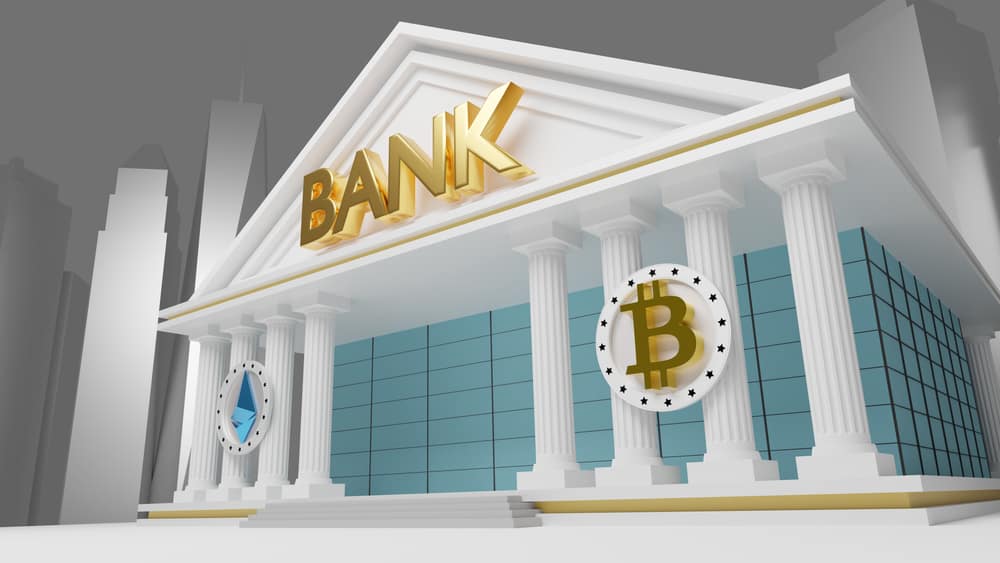It seems like one can hardly turn on the news these days without hearing the sounds of another investment bank hopping on the Bitcoin bandwagon. If Bitcoin used to be Wall Street’s favorite punching bag a couple of years ago, today, some of the most bullish voices are coming from the ivory towers of institutional finance. While Bitcoin by no means enjoys a consensus view amongst decision-makers on Wall Street, a growing chorus of contrarian voices is calling to include Bitcoin as part of a diversified portfolio.
Just last week, Morgan Stanley began offering its wealthiest clients access to Bitcoin investment funds, according to sources familiar with the matter. At this stage, only individuals worth over $2 million or firms worth at least $5 million can invest in Bitcoin through Morgan Stanley, and even then they are limited to investing a maximum of 2.5% of their total net worth. Despite these ultra-conservative beginnings, Morgan Stanley opening up to Bitcoin investments has the potential to unleash the floodgates of new, sophisticated capital into Bitcoin.
Without further ado, here’s a running collection of what some of the largest investment banks in the world have to say about Bitcoin.
Table of Contents
ToggleInvestment Bank: Citibank
Bitcoin Price Target: $318,000 per BTC by the end of 2021
A climate that blends low yields and inflationary expectations has boosted the view that Bitcoin could represent a safe haven for institutions. This view has long been predominant within the crypto industry as Bitcoin’s proponents talked up its inflation-resistant properties. Now, it features prominently in a report by Citibank’s Global Perspectives & Solutions (GPS) division. According to the bank, Bitcoin is at a ‘tipping point’ that could see it being adopted as a superior store of value and as an instrument for global trade.
Another highlight from the report was the statement that Bitcoin has successfully shifted from a predominantly short-term play to a long-term macro hedge and diversification tool. Over 57% of Bitcoin supply has not moved in over a year, an impressive number considering we’re in the midst of an epic bull market.
The data is in. Bitcoiners are HODLing!
Meet HODLwaves, an excellent resource for judging the extent to which Bitcoiners are HODLing as opposed to trading short-term.
57% of the #Bitcoin supply has not moved in over a year. During an epic bull market. Impressive.#HODL pic.twitter.com/2F10g8qMg0
— Coinmama (@coinmama) February 22, 2021
An earlier leaked report from Thomas Fitzpatrick, global head of the company’s CitiFXTechnicals market insight product, went a step further by predicting that Bitcoin will reach $318,000 by the end of the year. He did so by using technical analysis on a Bitcoin price chart going back to 2011. While technical analysis does have its limitations in predicting Bitcoin’s value so far into the future, the fact that institutional clients are exposed to such bullish rhetoric bodes excellently for Bitcoin.
Investment Bank: JP Morgan
Bitcoin Price Target: $146,000 (long-term)
Out of all the detractors of Bitcoin that have since turned bullish, perhaps none represent the shift in sentiment quite like JP Morgan. Once upon a time, their CEO Jamie Dimon told everyone that Bitcoin was ‘worse than tulip bubbles’ and threatening to fire any employee caught dabbling in Bitcoin. Today, its analysts are touting Bitcoin as a legitimate challenger of gold. They have set a price target of $146,000 per Bitcoin to reflect the fact that Bitcoin is competing with gold for institutional inflows.
Not only is JP Morgan now accepting crypto companies as clients, but they also recently advised investors to put 1% of their portfolio in Bitcoin. If JP Morgan would follow their own advice and invest 1% of its $1 trillion portfolio, we would see an additional $10 billion flow into Bitcoin.
Investment Bank: Goldman Sachs
A big shakeup is coming to Goldman Sachs’ Global Markets segment. The division, the bank’s largest by assets and revenue at the end of last year, will soon be home to Goldman’s Bitcoin trading desk. After its initial launch in 2018, Goldman Sachs shelved the Bitcoin trading desk as investor sentiment surrounding Bitcoin cooled down. With Bitcoin climbing to record highs amidst renewed institutional enthusiasm, Goldman’s chiefs decided that the time had come to reboot their cryptocurrency trading plans.
The desk will buy and sell Bitcoin futures on behalf of clients but not actively manage cryptocurrencies. Additionally, the bank is exploring the possibility of a Bitcoin ETF and becoming a custodian for real Bitcoin.
While Goldman Sachs continues to edge closer to becoming a Bitcoin-friendly bank, one of its notable alumni is blazing the trail for large-scale investors in the digital currency space. Raoul Pal, previous Head of European Hedge Fund Sales in equities and equity derivatives, is one of the leading voices advocating for the bitcoin standard through his company Real Vision. In late 2020, Pal announced that he was selling the last of his gold, and that 98% of his liquid net worth was now in crypto.
Ok, last bomb – I have a sell order in tomorrow to sell all my gold and to scale in to buy BTC and ETH (80/20). I dont own anything else (except some bond calls and some $'s). 98% of my liquid net worth. See, you can't categorize me except #irresponsiblylong Good night all.
— Raoul Pal (@RaoulGMI) November 30, 2020
Investment Bank: Morgan Stanley
Bitcoin has emerged from the shadows, broken through the traditionalists’ resistance, and is finally here to stay as a serious asset class. Such is the sentiment presented by Ruchir Sharma, Head of Emerging Markets and Global Macro at Morgan Stanley, in a February 2021 report. Sharma’s report contains some of the most vital points Bitcoiners have been going on about for years. Here’s a summary of JP Morgan’s Bitcoin report.
- Bitcoin is the best-performing asset of the last decade, with an average of 200% returns each year during the period. At the same time, Bitcoin is closing the volatility gap and behaving more like an established asset.
- Without even intending to, central banks have fueled the rush into cryptocurrencies. The money printing binge that central banks have been on since COVID began has undermined confidence in all national currencies. Simultaneously, Bitcoin’s fixed, predictable supply schedule was once again on display during the May 2020 halving.
- Generational trends also contribute to the rise of cryptocurrencies, as more younger people associate ‘crypto’ with an exciting transformation of old money. For the millennial set, the open-source software behind Bitcoin makes it a more transparent, transferrable, and trustworthy alternative to traditional finance. Only 3 percent of baby boomers in the United States said they own a cryptocurrency, compared to 27 percent of millennials.
- The dollar’s reserve currency status probably won’t last forever. Before the dollar reigned supreme, Portugal, Spain, the Netherlands, France and Britain enjoyed reserve status for 94 years each on average. With a run extending back nearly 100 years, the US dollar has exceeded a reserve currency’s expected lifetime.
While Morgan Stanley’s report doesn’t go as far as calling Bitcoin a direct challenger to the dollar’s supremacy, it does warn readers not to underestimate Bitcoin. Not content with simply writing reports, it seems like Morgan Stanley are ready to put their money where their mouth is. The bank is considering investing in Bitcoin through its Counterpoint Global investment unit, a $150 billion fund focusing on long-term investments across fundamentally promising assets. Furthermore, Morgan Stanley’s wealthy clients can now invest in Bitcoin through three different funds offered by the bank. Two of those funds are products of Galaxy Digital, a crypto firm founded by Mike Novogratz.
Are The Bankers Even More Bullish Than We Think?
One of the highlights in both the Citibank and Morgan Stanley reports is that investment bankers see Bitcoin as a legitimate medium of exchange today. Citi’s report focuses on Bitcoin’s potential in the realm of international trade, while Morgan Stanley chose instead to zoom in on Bitcoin as a tool for remittance. What both reports have in common is the belief that Bitcoin can do more than just store value. Indeed, it’s the institutional focus on Bitcoin’s role in global payments that demonstrates just how powerful it can be over the next few years.
Sometimes it takes an outsider’s view to put things into perspective. The dominant view amongst Bitcoiners is that Bitcoin should first optimize for its role as an inflation-resistant hedge asset before moving on to become a credible means of exchange. While more and more bankers are coming around to this point of view, their willingness to see Bitcoin as more than just an investment asset suggests that the adoption curve is accelerating quicker than expected.





